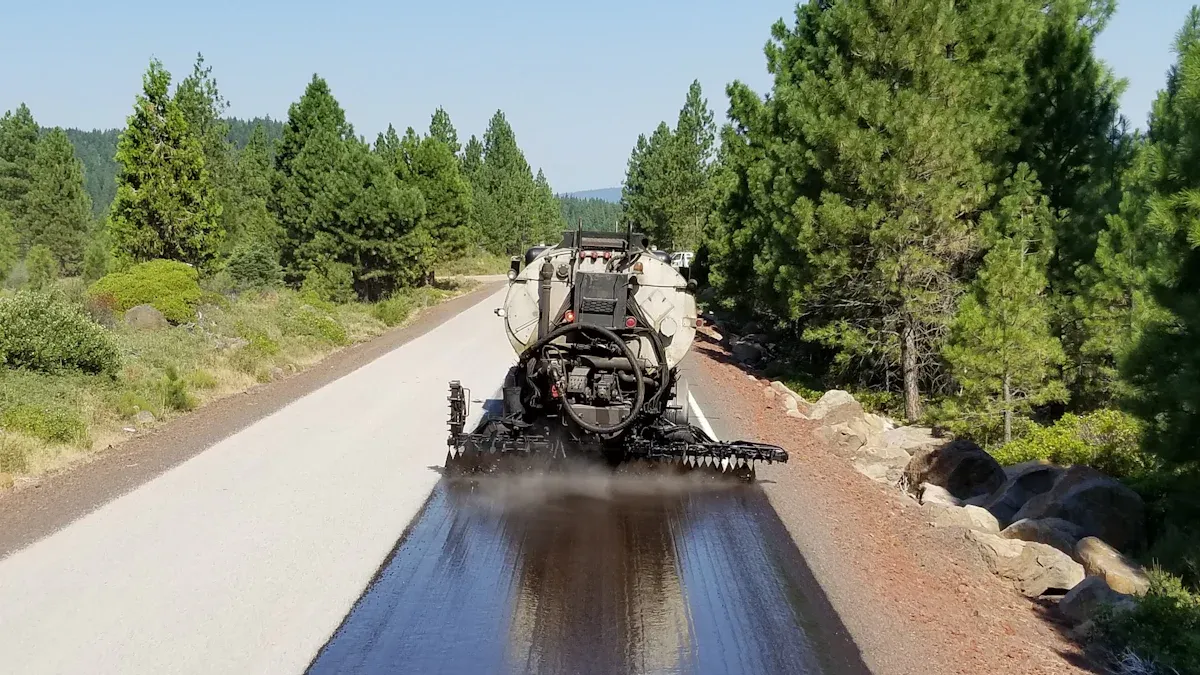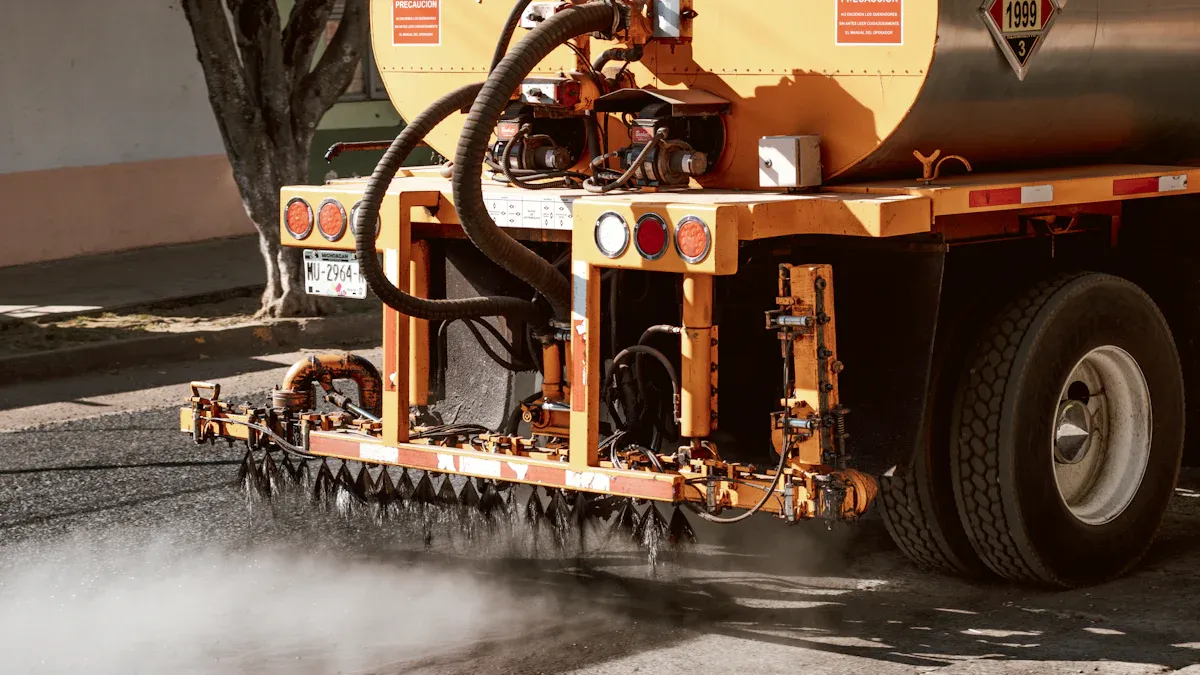
Seals play a vital role in keeping your asphalt mixing plant efficient and durable. They prevent leaks and ensure smooth operation, even under extreme conditions. Without proper care, seals can wear out, impacting asphalt production. To extend their lifespan, you should focus on regular maintenance, address wear causes, and adopt preventive measures.

Seals are essential for the smooth operation of your asphalt mixing plant. They prevent leaks and maintain pressure, ensuring that the plant operates efficiently. Without properly functioning seals, the plant's components may not work together as intended. This can lead to uneven asphalt production and wasted resources. Seals also act as a barrier, protecting the plant from external contaminants like dust and debris. By keeping these elements out, seals help maintain the quality of the asphalt produced.
Regular maintenance of seals plays a critical role in preserving their effectiveness. Activities like seal coating protect asphalt from harmful elements such as UV rays and moisture. These measures not only extend the life of the seals but also imp rove the overall performance of the plant. Investing in routine maintenance is far more cost-effective than dealing with major repairs or replacing damaged equipment.
Seal failure can have serious consequences for asphalt production. When seals wear out or become damaged, leaks can occur, leading to a loss of materials and reduced efficiency. This can disrupt the production process and result in delays. Additionally, damaged seals may allow contaminants to enter the system, compromising the quality of the asphalt. Poor-quality asphalt can lead to structural issues in the final product, such as cracks or potholes.
Ignoring seal maintenance can also increase operational costs. Repairs for damaged equipment or resurfacing asphalt are significantly more expensive than regular upkeep. By addressing seal issues promptly, you can avoid costly downtime and ensure consistent production quali ty.
High temperatures and pressure can significantly impact the durability of seals in your asphalt mixing plant. Excessive heat causes physical and chemical changes in seal materials. For example:
- O-rings may swell and harden, leading to permanent deformation.
- Prolonged exposure to heat can rend
er seals non-functional.
Studies have shown that high temperatures, ranging from 500 to 1000 °C, reduce the mechanical strength of materials. This degradation weakens seals, making them prone to failure. Pressure also plays a role by increasing the stress on seals, which accelerates wear and tear. To combat these effects, you should monito r operating conditions and ensure seals are designed to withstand extreme environments.
Material buildup and contamination are common culprits behind seal wear. Contaminants, such as carbon dust or solidified product residue, interfere with the seal's operation. This int
erference leads to abrasive wear and leakage. For instance:
- Carbon dust, generated by friction, damages seal faces.
- Product buildup creates a leak path, especially during low flow conditions.
Contamination also causes corrosion, which affects both the seal and the shaft. To minimize these risks, implement proper filtration systems and establish regular cleaning routines. These measures help maintain seal performance and extend their lifespan.
Using low-quality or incompatible seals can jeopardize the efficiency of your asphalt mixing plant. Inferior seals may not withstand the high temperatures, pressure, or abrasive materials involved in asphalt production. They degrade quickly, leading to frequent replacements and increased downtime. Incompatible seals, on the other hand, may not fit properly or react poorly with the materials they encounter. Always choose seals made from high-quality materials and ensure they are compatible with your plant's specifications. This invest ment reduces long-term costs and ensures consistent asphalt production.
Regular inspections are essential for maintaining the integrity of your sealcoat system. By identifying early signs of wear or damage, you can address issues before they escalate. Inspections should focus on checking for cracks, leaks, or material buildup around the seals. These problems, if left unchecked, can compromise the performance of your asphalt mixing plant.
In one notable case, a food processing company experienced a costly contamination incident due to a neglected seal. A faulty se al allowed bacteria to enter the production line, leading to a product recall and financial losses. This example highlights the importance of consistent monitoring to prevent similar risks in your operations.
To ensure thorough inspections, create a checklist that includes:
- Examining seals for visible damage or deformation.
- Checking for proper alignment and fit.
- Monitoring for unusual noises or vibrations during operation.
These steps will help you maintain a reliable sealcoat system and avoid unexpected downtime.
Lubrication plays a critical role in extending the life of your seals. Properly lubricated seals reduce friction, minimize wear, and improve overall efficiency. Use high-quality lubricants that are compatible with your equipment and operating conditions. Av oid over-lubricating, as this can attract dust and debris, leading to contamination.
Educate your staff on best practices for lubrication. Regular training sessions ensure that your team understands the correct application methods and the importance of using the right type of lubricant. This pr oactive approach reduces the risk of seal failure and enhances the performance of your asphalt mixing plant.
Using a properly mixed asphalt sealcoat ensures optimal protection for your pavement. A well-mixed sealcoat provides a uniform layer that shields the asphalt from harmful elements like UV rays, wind, and petrochemicals. This protective barrier prevents cracks and extends t he lifespan of the asphalt surface.
Industry benchmarks recommend applying sealcoat every 3-4 years after the initial application to maintain surface integrity. The table below summarizes key best practices for sealcoating:
| Best Practice | Description |
|---|---|
| Sealcoating Frequency | Recommended every 3-4 years after the initial application to maintain surface integrity. |
| Material Selection | Choose based on parking lot design, condition, and traffic patterns. |
| Protective Properties | Sealcoating protects against wind, UV rays, and petrochemicals, prolonging asphalt life. |
By following these guidelines, you can maximize the durability and aesthetic appeal of your asphalt surfaces.
Proper training equips your staff with the skills needed to handle seals effectively. Well-trained personnel can identify potential issues, apply lubrication correctly, and perform routine maintenance tasks with confidence. Regular training sessions also ensure that your team stays updated on the latest techniques and industry standards.
Key training topics should include:
- Bes
t practices for inspecting and repairing seals.
- P
roper use of tools and equipment for seal maintenance.
- Tec
hniques for applying pavement sealer and maintaining the sealcoat system.
Investing in staff training not only improves maintenance quality but also reduces the risk of costly errors. A knowledgeable team ensures that your asphalt mixing plant operates efficiently and reliably.

A consistent maintenance schedule is essential for keeping your asphalt mixing plant seals in optimal condition. Regular upkeep prevents unexpected failures and extends the lifespan of your sealcoat system. You should create a schedule that includes daily, weekly, and monthly tasks. This approach ensures that every aspect of seal maintenance is addressed systematically.
Daily tasks might involve inspecting seals for visible damage or leaks. Weekly checks could focus on cleaning seals and removing material buildup. Monthly maintenance should include more detailed inspections, such as assessing the condition of the sealcoat system and verifying the alig nment of seals. By following a structured schedule, you can catch potential issues early and avoid costly repairs.
Tip: Use a digital maintenance tracker to organize tasks and set reminders. This tool helps you stay on top of your schedule and ensures no critical maintenance steps are overlooked.
A sample schedule can guide you in planning seal inspections and replacements effectively. Below is an example of a mainte nance timeline for asphalt mixing plant seals:
| Frequency | T ask Description | Tools Needed |
|---|---|---|
| Daily | Inspect seals for cracks, leaks, or material buildup. | Flashlight, inspection kit |
| Weekly | Clean seals and check fo r proper lubrication. | Cleaning supplies, lubricant |
| Monthly | Assess seal alignment and replace worn-out seals. | Alignment tools, replacement seals |
| Quarterly | Evaluate the seal coat system for wear and tear. | Sealcoat applicator, pavement sealer |
| Annually | Perform a full system overhaul and replace all seals. | Dust collection equipment, sealer |
This schedule ensures that your seals remain functional and your asphalt mixing plant operates efficiently. Adjust the timeline based on your plant's workload and environmental conditions.
Having the right tools and resources simplifies seal maintenance and improves its effectiveness. Essential tools include inspection kits, cleaning supplies, and lubricants. These items help you perform routine tasks like checking for leaks, cleaning seals, and applying lubrication. For more advanced maintenance, you may need alignme nt tools, replacement seals, and dust collection equipment.
Investing in high-quality resources ensures better results. For example, using a premium sealer reduces the risk of seal failure and enhances the durability of your sealcoat system. Additionally, training your staff to use these tools correctly boosts eff iciency and minimizes errors.
Note: Partnering wit h reliable suppliers for tools and materials guarantees consistent quality. Look for suppliers who specialize in asphalt sealcoat products and equipment.
Recognizing early signs of seal wear can save you from costly repairs. Look for visible cracks, leaks, or deformation around the seals. Unusual noises or vibrations during operation often indicate misalignment or damage. Material buildup near the seals may also signal wear. Regularly inspecting your sealcoat system helps you catch these issues before they escalate. A neglected seal can lea d to contamination, reducing the efficiency of your asphalt mixing plant.
Replacing seals on time prevents prolonged downtime and production losses. Fixed assets like seals have finite lifecycles. Planning replacements based on their expected lifespan ensures smooth operations. Delaying replacements can result in uncontrolled leakage, product lo
ss, and equipment damage. For example:
- A man
ufacturing plant with aging machinery can forecast the remaining life of its seals. By scheduling timely replacements, the plant avoids sudden breakdowns and disruptions.
- Proper planning reduces the risk of unexpected fa
ilures, saving you from costly repairs and lost productivity.
Timely action keeps your sealcoat system reliable and your plant running efficiently.
Investing in high-quality seals ensures durability and compatibility with your equipment. Low-quality seals degrade quickly, leading to frequent replacements and increased downtime. Choose seals made from materials that can withstand high temperatures and pressure. Ensure they fit your plant's specifications to avoid misalignment or poor performance. Using a premium sealer during maintenance enhances the longevity of your sealcoat system. Partnering with reliable suppliers guarantees consistent quality a nd optimal results.
Tip: Always keep spare seals and dust col lection equipment on hand. This preparation minimizes downtime during replacements.
Proactive maintenance ensures your asphalt mixing plant seals last longer. Focus on key strategies like addressing wear causes, following a maintenance schedule, and using high-quality materials.
Tip: Prioritize seal care to avoid costly downtime and maintain optimal performance. A well-maintained plant produces better results and saves you money in the long run.
Use a soft brush and a non-abrasive cleaner to remove debris. Avoid harsh chemicals that can damage the seal material. Regular cleaning prevents buildup and extends seal life.
Tip: Clean seals weekly to maintain their efficiency and prevent contamination.
Inspect seals daily for visible damage or leaks. Weekly checks should include cleaning and lubrication. Regular inspections help you catch issues early and avoid costly repairs.
No, always use lubricants compatible with your equipment and operating conditions. Incompatible lubricants can degrade seals and reduce the ir lifespan. Check the manufacturer's recommendations for guidance.
Note: High-quality lubricants improve seal performance and reduce wear.